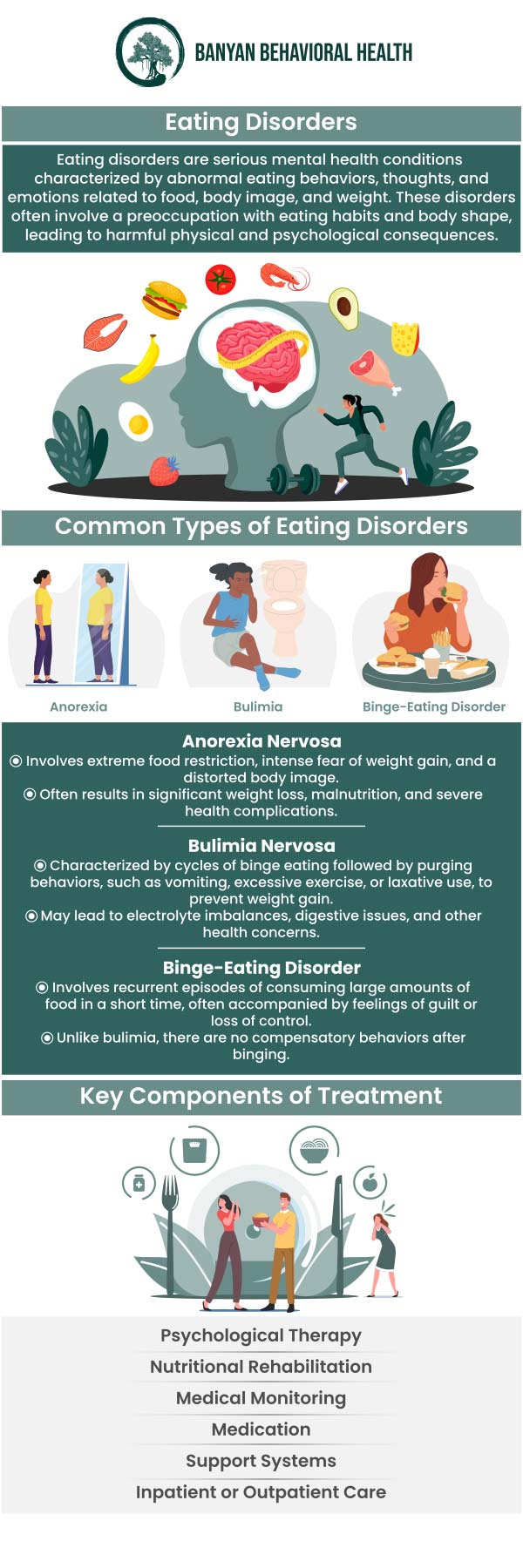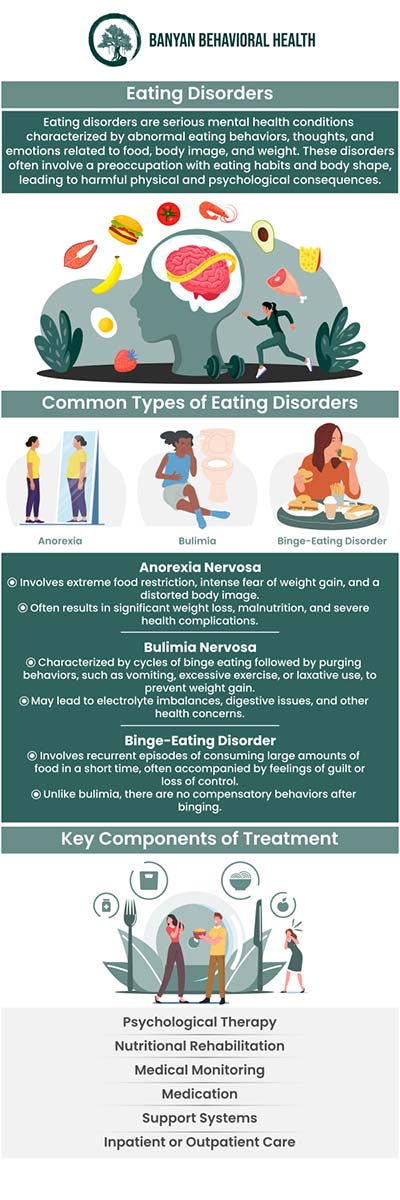Eating Disorders Treatment Specialist in Burlingame, CA
At Banyan Behavioral Health, our team specializes in treating eating disorders, offering personalized care to help individuals develop healthier relationships with food and their bodies. We provide comprehensive treatment plans tailored to each patient’s unique needs, aiming to address the emotional, psychological, and physical aspects of eating disorders. Through a combination of therapeutic techniques, we support patients in building coping strategies, improving self-esteem, and achieving long-term recovery. For more information, contact us or schedule an appointment online. We are located at 877 Mahler Road, Suite 160, Burlingame, CA 94010.




Table of Contents:
What are the signs and symptoms of eating disorders?
How are eating disorders diagnosed?
Can eating disorders be cured?
Can therapy help with eating disorders?
At Banyan Behavioral Health, we understand the complex nature of eating disorders and the significant impact they can have on individuals’ physical and emotional well-being. We are dedicated to providing comprehensive care for those struggling with these challenging conditions. Recognizing the signs and symptoms of eating disorders is crucial for early intervention and successful treatment, and our team is skilled in identifying these indicators and providing the necessary support.
We are aware that individuals with eating disorders often have a preoccupation with food, body weight, and shape, which can manifest in various ways. Our compassionate professionals are trained to detect these symptoms and offer personalized treatment plans tailored to each individual’s needs. Whether it’s addressing the dramatic weight loss seen in anorexia nervosa or the fluctuating weight in bulimia nervosa, we focus on both the psychological and physical aspects of the disorder.
At Banyan Behavioral Health, we also pay close attention to the behavioral changes associated with eating disorders. Our team is experienced in recognizing patterns such as secretive eating, meal avoidance, and food-related rituals. We understand that these behaviors can lead to social withdrawal and the development of compulsive exercise routines. By addressing these issues, we aim to foster healthier coping mechanisms and encourage positive social interactions.
Moreover, we recognize the emotional challenges that accompany eating disorders. Our approach includes support for co-occurring mood disorders such as depression and anxiety. We provide a safe space for individuals to express their feelings and work through their emotional struggles, with the goal of reducing isolation and improving overall mental health.
Physical manifestations, such as hair loss, dry skin, and other signs of malnutrition or purging behaviors, are also carefully monitored by our team. At Banyan Behavioral Health, we prioritize medical assessments alongside psychological support to ensure a holistic approach to treatment.
By recognizing the early signs and symptoms of eating disorders, Banyan Behavioral Health is committed to delivering effective treatment and improving the prognosis for those affected. Our goal is to empower individuals on their journey to recovery, supporting them every step of the way with empathy and expertise.
The process begins with a thorough medical history review to assess the individual’s physical health, eating habits, and psychological well-being. Understanding these patterns is essential for identifying potential eating disorders, such as anorexia nervosa, bulimia nervosa, or binge-eating disorder.
We conduct a detailed physical examination to evaluate the physiological effects of disordered eating. This may involve checking vital signs, calculating body mass index (BMI), and performing blood tests to detect any nutritional deficiencies or organ function impairments.
Psychological evaluation forms a cornerstone of our diagnostic approach. Our mental health professionals utilize structured interviews and standardized questionnaires, to delve into the patient’s relationship with food, body image, and self-esteem.
Our team also references the Diagnostic and Statistical Manual of Mental Disorders (DSM-5) criteria to accurately identify and classify the specific type of eating disorder. This involves assessing the frequency and intensity of symptoms and understanding their impact on the patient’s daily life and overall well-being.
At Banyan Behavioral Health, we emphasize a multidisciplinary approach, ensuring that all aspects of the eating disorder, both physical and psychological, are addressed. Early diagnosis and intervention are critical, and we are committed to providing personalized care and support to foster recovery and improve outcomes for our patients.
Eating disorders can be managed and treated effectively, but recovery is a gradual process that often requires ongoing support and care. While “cure” can mean different things for different individuals, many people can fully recover or learn to manage their symptoms with the right treatment. Treatment typically involves a combination of therapy, nutritional counseling, and support groups, which help individuals address the underlying emotional, psychological, and behavioral factors contributing to the disorder.
Therapy, such as cognitive-behavioral therapy (CBT), is one of the most effective treatments for eating disorders. CBT helps individuals challenge negative thought patterns and behaviors related to food, body image, and self-worth. Nutritional therapy also plays a critical role, helping individuals restore healthy eating habits and develop a balanced relationship with food. In some cases, medication may be prescribed to address co-occurring conditions like anxiety or depression that contribute to the eating disorder.
For lasting recovery, it’s important to continue following a treatment plan and seek ongoing support. While recovery may look different for everyone, many individuals who receive early intervention and comprehensive care can significantly improve their quality of life and achieve long-term health and well-being.
Ultimately, our goal is to help individuals reach a point where they experience significant improvements in their mental and physical health, leading to a fulfilling life. Recovery at Banyan Behavioral Health is a collaborative journey, requiring patience, support, and a commitment to long-term well-being.
Therapy plays a crucial role in the recovery journey for individuals dealing with eating disorders. We are committed to offering a comprehensive and personalized approach to treatment, utilizing a variety of therapeutic techniques to address the psychological, emotional, and behavioral complexities of these disorders.
Eating disorders, including anorexia nervosa, bulimia nervosa, and binge-eating disorder, often stem from intricate interactions between emotional health, family dynamics, and societal pressures. Our therapeutic interventions are designed to unravel these complexities and foster healthier relationships with food and body image.
Cognitive-behavioral therapy (CBT) is highly effective for treating eating disorders. It helps individuals identify and challenge negative thoughts related to food, body image, and self-worth. By changing these patterns, CBT promotes healthier behaviors and coping mechanisms, breaking the cycle of disordered eating.
Family-based therapy (FBT) is especially important for adolescents. It involves family members in treatment, recognizing the significant role they play in supporting recovery. FBT fosters a nurturing and understanding environment that promotes positive change and healing.
Dialectical behavior therapy (DBT) helps individuals build skills in emotional regulation, distress tolerance, and mindfulness. These skills aid in managing intense emotions, reducing the need for disordered eating as a coping mechanism. Other therapies, such as interpersonal therapy (IPT) and acceptance and commitment therapy (ACT), can also be beneficial. IPT enhances interpersonal relationships, while ACT encourages a healthier self-image and relationship with food.
Our goal is to help our clients achieve lasting recovery, restore physical health, and improve overall well-being through a combination of evidence-based therapeutic techniques. For more information, contact us or schedule an appointment online. We are located at 877 Mahler Road, Suite 160, Burlingame, CA 94010. We serve patients from Burlingame CA, Foster City CA, South San Francisco CA, San Bruno CA, Belmont CA, Hillsborough CA, Millbrae CA, San Mateo CA and surrounding areas.

Additional Services You May Need

Additional Services You May Need




